+86-18927501869
- All
- Product Name
- Product Keyword
- Product Model
- Product Summary
- Product Description
- Multi Field Search
 English
EnglishViews: 1514 Author: Joe Publish Time: 2025-09-09 Origin: Site
In today's society, "quality of life and environmental protection" have become hot topics of common concern. Do you yearn to reduce the burden on the environment? It's time to consider replacing traditional paper towels with bamboo fiber wet wipes. Biodegradable bamboo wipes are not only an environmentally friendly option but also bring many additional benefits that improve the lifestyle.
Bamboo fiber wet wipes stand out for their eco-friendliness, biodegradability, and antibacterial properties. Made entirely from natural bamboo fibers, this material is not only environmentally friendly but also suitable for personal hygiene and baby care due to its gentle and antibacterial characteristics. The rapid growth and natural degradability of bamboo make it a true green fiber, helping to reduce environmental pollution.
Sywipe, as a leading manufacturer of bamboo wet wipes, is committed to producing wipes that are both eco-friendly and antibacterial, and hypoallergenic. Our wipes offer not only a healthier and more sustainable choice for personal care but also a commitment to environmental responsibility.
Our products represent an improvement over traditional wet wipes, providing users with a more natural and eco-friendly option. By combining natural materials with innovative technology, Sywipe wet wipes offer users a solution that promotes health and sustainable development. Let's choose Sywipe bamboo wipes together and step towards a greener, healthier future.
Click here to learn more! Bamboo Baby Wipes: Do They Kill Germs?
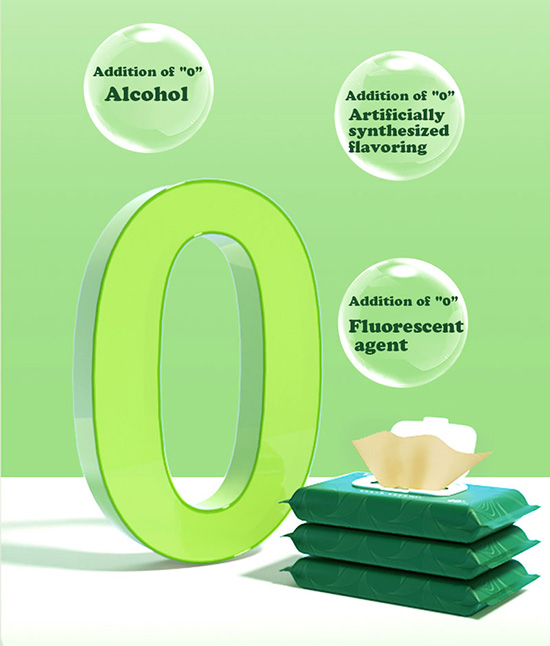
Bamboo fiber wet wipes are cleaning products made from bamboo fibers (such as natural bamboo pulp, bamboo viscose, etc.), and they serve as an eco-friendly alternative to traditional synthetic wet wipes. Unlike conventional wipes—which are often composed of plastics like polyester or polypropylene and contribute to long-term environmental pollution—bamboo wipes decompose naturally within several weeks to months under appropriate composting conditions.
A standout feature of bamboo is its inherent bioactive component, bamboo kun, which provides natural resistance to bacteria and fungi. This reduces the need for artificial preservatives, making bamboo wipes ideal for sensitive skin, baby care, and daily hygiene with minimal risk of irritation.
The fibers in bamboo are both soft and strong, which makes the wipes tough enough for cleaning but still gentle on the skin. They're also pH-balanced, meaning they match your skin's natural balance and are less likely to irritate. That's what makes them a great choice for everyone—from little kids to older adults.
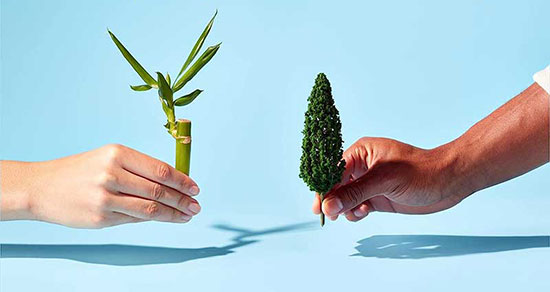
Bamboo wipes possess various advantages, including degradability, comfort and softness, antibacterial properties, and multifunctionality. Their natural environmental friendliness, comfortable user experience, and guarantees of health and hygiene are the reasons why they are favored by consumers in the market.
• Degradable: Made from natural bamboo fibers, bamboo fiber wet wipes are degradable and do not pollute the environment. Compared to traditional wet wipes, they have better degradability and can be disposed of without causing environmental pollution, meeting the strong demands of modern people for environmental protection.
• Comfort and Softness: The material of bamboo fiber wet wipes is soft and has a pleasant texture, making it easy to clean facial and hand areas. Moreover, they do not cause any skin discomfort during use, making them a comfortable skincare product.
• Antibacterial and Bacteriostatic: Bamboo fiber products have natural antibacterial, bacteriostatic, and germicidal effects. Under a microscope, bacteria can multiply in cotton and wood fiber products, but they cannot survive for long on bamboo fiber products, and they can even disappear or decrease within a short time. The mortality rate of bacteria on bamboo fiber products is over 75% within 24 hours. This provides you with cleaner wipes for better health.
• Multipurpose: The use of bamboo fiber wet wipes is very extensive and suitable for infants, young children, and adults. They enrich family life and can also be used commercially, such as in hotels and restaurants.
Experts have put forth various suggestions on the versatile uses of bamboo in everyday life, showcasing the limitless potential of this multifunctional material. Learn more about bamboo. Bamboo Bliss: Expert Tips for Sustainable Living,
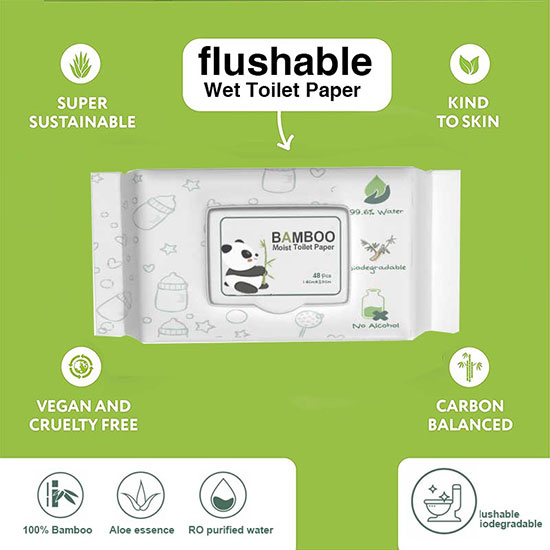
Bamboo baby wipes are formulated to be gentle and effective, and their ingredients typically reflect a commitment to natural and eco-friendly components. Here are some common ingredients found in bamboo wipes:
• Bamboo Fibers: The key ingredient, providing softness and strength to the wipes. Bamboo fibers are known for their natural antimicrobial properties.
• Purified Water: Used as the base to moisten the wipes, often filtered to ensure purity.
• Gentle Cleaners: Surfactants that help remove dirt and debris without harming the skin or the environment.
• Aloe Vera: A natural moisturizer known for its soothing properties, often included for its skin-friendly benefits.
• Calendula Extract: An ingredient with anti-inflammatory properties, which can be particularly gentle on sensitive skin.
• Vitamin E: An antioxidant that helps protect and nourish the skin.
• Glycerin: A humectant that attracts moisture to the skin, keeping it hydrated.
• Natural Preservatives: To extend the shelf life of the wipes while avoiding harmful chemicals.
• Chamomile Extract: For its calming effects on the skin.
• Other Botanical Extracts: Such as green tea or cucumber, which can provide additional soothing and nourishing benefits.
Every great product starts with a great process. Here's how we bring you the best in bamboo wet wipes:
• Bamboo Harvesting: We select only the finest bamboo, ensuring that our source is sustainable and our impact is minimal.
• Fiber Extraction: A meticulous process that transforms bamboo into the soft, strong fibers that make up our wipes.
• Wiping Solution: We infuse our wipes with a solution that's as pure as it gets, often enhanced with organic extracts for an extra touch of nature.
• Cutting and Packaging: Precision cut and packaged with care, our wipes are ready to bring a touch of green to your routine.
• Bamboo Fiber Wet Wipes: Mainly composed of natural bamboo fibers, water, and sometimes organic extracts, minimizing the presence of irritating chemical substances.
• Non-woven Wet Wipes: Often contain synthetic materials, preservatives, and chemicals used for fragrance or antibacterial purposes, which may cause skin irritation, especially for people with sensitive skin.
• Bamboo Fiber Wet Wipes: Due to the use of biodegradable bamboo fibers, they generally have a smaller environmental impact. The production process is usually more sustainable and contributes to environmentally friendly disposal.
• Non-woven Wet Wipes: Containing non-biodegradable materials, they may cause environmental issues. Improper disposal can lead to long-term environmental damage.
• Bamboo Fiber Wet Wipes: Have hypoallergenic and gentle properties, making them suitable for people with sensitive skin. They do not contain irritating chemical substances, reducing the risk of skin irritation.
• Non-woven Wet Wipes: Due to the presence of synthetic compounds and preservatives, some users may experience skin irritation or allergic reactions.
• Bamboo Wet Wipes: Bamboo tissues are typically processed through steps such as steaming, washing, screening, and bleaching to make pulp, which is then processed into tissues. The bamboo pulp fibers are longer, and special processes may be required during manufacturing to handle the fibers and ensure the quality of the paper.
• Non-woven: The production processes are diverse, with common methods including spunbond, meltblown, and hydroentanglement. For example, the spunbond method involves extruding polymer melt through fine holes, then cooling and solidifying the fibers in the air before laying them into a net and reinforcing them; hydroentanglement uses high-pressure water streams to impact the fiber web, causing the fibers to intertwine and form non-woven fabric.
• Bamboo Fiber Wet Wipes: Bamboo fibers are highly regarded for their durability and softness, making them very suitable for wet wipes. Their inherent fibers have an exceptionally soft and delicate texture, providing a luxurious feel without any discomfort or irritation. Bamboo fibers have high water absorption, allowing wet wipes to effectively retain moisture, which is a key factor in achieving efficient cleaning.
• Non-woven Wet Wipes: Hydroentangled non-woven fabric has multiple advantages in the application of wet wipes, contributing to their popularity and effectiveness. These benefits include being soft and gentle on the skin, highly absorbent, strong, and durable.
Biodegradable: Bamboo wipes decompose naturally, leaving no plastic residue.
Low Carbon Footprint: Bamboo absorbs significant CO₂ during growth.
Reduced Water Usage: Bamboo requires far less water than cotton.
| Feature | Conventional Wipes | Bamboo Wipes |
| Material | Plastic-based | Natural bamboo fiber |
| Biodegradability | Low | High |
| Skin-friendly | Moderate | Hypoallergenic, low pH |
| Antimicrobial Properties | Requires chemicals | Naturally present |
| Environmental Impact | High pollution | Eco-friendly, low footprint |
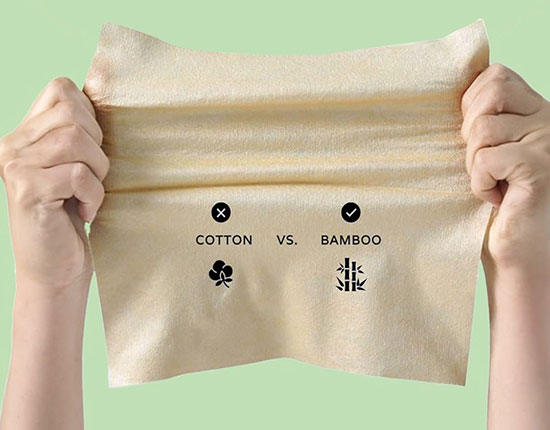
• Bamboo Fiber Wet Wipes: Made from bamboo, a rapidly growing plant that matures in 3-5 years without the need for fertilizers and pesticides. This fast growth cycle makes bamboo a sustainable resource.
• Wood Pulp Wet Wipes: Typically sourced from trees like eucalyptus or pine, which have longer growth cycles, often taking decades to mature. Deforestation and pulp production have a significant environmental impact.
• Bamboo Fiber Wet Wipes: More eco-friendly, as bamboo absorbs more carbon dioxide during growth and requires less water and land resources. Additionally, bamboo fiber wet wipes are more easily biodegradable after use.
• Wood Pulp Wet Wipes: Due to the long growth cycle of trees, they have a greater environmental impact. Pulp wet wipes decompose more slowly in the natural environment, potentially affecting soil and water quality over the long term.
• Bamboo Fiber Wet Wipes: Usually softer and smoother, providing a more comfortable user experience, especially suitable for sensitive skin.
• Wood Pulp Wet Wipes: May have a rougher texture, which may not be gentle enough for sensitive skin.
• Bamboo Fiber Wet Wipes: Have better absorbency and strength, are less likely to tear, and offer greater durability.
• Wood Pulp Wet Wipes: May be more prone to falling apart when wet, with potentially inferior strength and durability compared to bamboo fiber wet wipes.
• Bamboo Fiber Wet Wipes: Bamboo naturally contains antimicrobial components, giving bamboo fiber wet wipes certain antimicrobial properties.
• Wood Pulp Wet Wipes: Typically do not possess natural antimicrobial properties and may require the addition of chemical components to enhance their antimicrobial performance.
• Bamboo Fiber Wet Wipes: Some bamboo fiber wet wipes may be labeled as flushable, but the actual situation varies by product and could potentially clog sewer systems.
• Wood Pulp Wet Wipes: Generally not recommended for flushing, as they may cause blockages in sewer systems.
• Bamboo Fiber Wet Wipes: May have higher production costs, resulting in prices slightly above those of pulp wet wipes.
• Wood Pulp Wet Wipes: Have lower production costs, so they are usually more affordable.
• Bamboo Fiber Wet Wipes: May be more popular among consumers who are environmentally conscious and seek natural, sustainable products.
• Wood Pulp Wet Wipes: May be more appealing to consumers who are price-sensitive or have less stringent sustainability requirements.
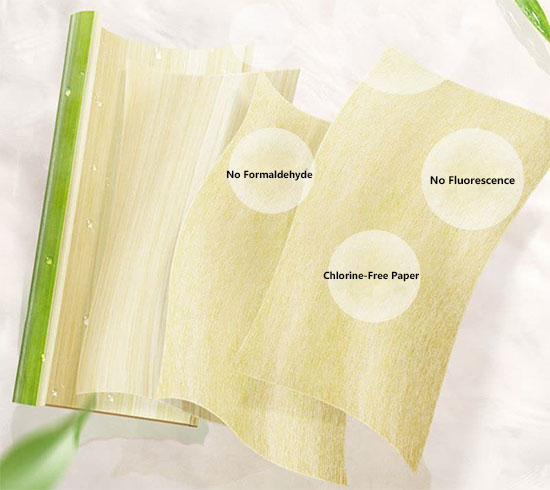
• Ingredient Safety: First and foremost, pay attention to the composition of the wet wipes, avoiding those with harmful substances such as alcohol, fragrances, and fluorescent agents. Opt for products that contain natural ingredients like aloe vera and calendula for added safety.
• Material Selection: Bamboo fiber wet wipes are both soft and eco-friendly, making them suitable for sensitive skin and baby use. The soft texture of bamboo fiber wet wipes causes less friction and irritation on the skin, making them ideal for wiping the face and body.
• Moisture and Strength: High-quality bamboo wet wipes should have just the right amount of moisture, not too dry or too wet. The paper should be thick and strong; too thin and they tear easily, too thick and they are hard to use. Bamboo wet wipes typically have strong water absorption and do not easily fall apart even when wet, making them suitable for both dry and wet use.
• Brand Reputation: Choose brands with strict quality testing to ensure the safety and reliability of the products. Products from brands with good reputations usually have higher quality control standards in the production process.
• Usage Scenarios: Select the appropriate bamboo wet wipes based on the specific usage scenario. For example, for baby wipes, choose materials that are soft and irritation-free; for adult daily cleaning, opt for bamboo wet wipes with moderate moisture and good strength.
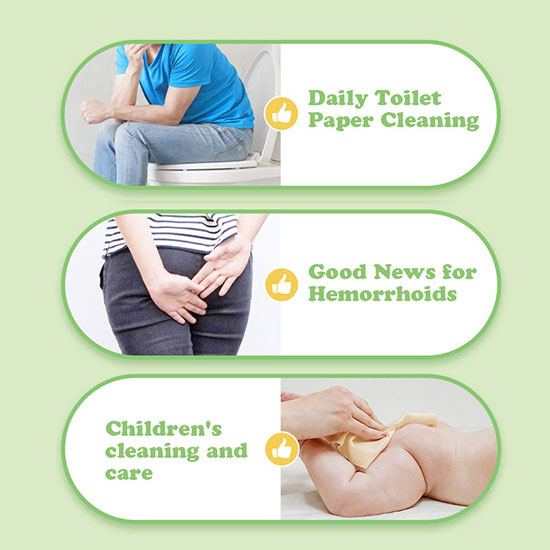
The flushability of bamboo wipes is a topic that requires careful consideration. While some bamboo wipes may be marketed as flushable, it's important to approach such claims with caution. Here are some points to consider:
• Disintegration Speed: Bamboo wipes that are labeled as flushable should disintegrate quickly in water. However, not all wipes that claim to be flushable will break down as quickly as necessary to avoid causing blockages in plumbing systems.
• Manufacturer Recommendations: It's crucial to check the manufacturer's guidelines regarding the disposal of their wipes. Some manufacturers may advise against flushing their wipes, even if they are labeled as flushable, to prevent potential plumbing issues.
• Plumbing Considerations: Even if a wipe disintegrates in water, it can still contribute to blockages in pipes and sewage systems, especially if it doesn't break down completely or quickly enough. Flushing wipes can lead to long-term damage to both personal plumbing and municipal sewage systems.
• Environmental Impact: The environmental impact of flushing wipes, whether they are bamboo or not, should be considered. They can contribute to pollution in waterways and harm marine life if they end up being improperly disposed of in natural water bodies.
• Local Regulations: Some local authorities have regulations against flushing wipes due to the issues they can cause with sewage systems. It's important to be aware of and comply with local waste disposal guidelines.
• Responsible Disposal Practices: Given the potential challenges associated with flushing bamboo wipes, it is generally advisable to dispose of them in a waste bin rather than flushing them down the toilet. This practice helps prevent plumbing issues and ensures that wipes are directed to appropriate waste management facilities.
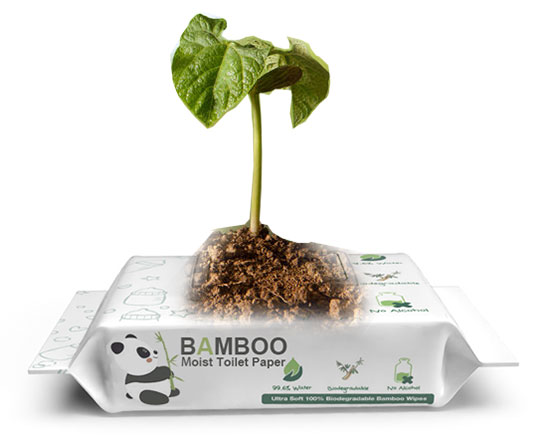
The biodegradation time of bamboo wet wipes depends on several factors, including their specific ingredients, environmental conditions, and the presence of additives. Here are some key factors that affect the biodegradation time of bamboo wet wipes:
• Ingredients: Wet wipes made entirely from natural bamboo fibers, without any synthetic materials, will typically biodegrade more effectively. If wet wipes contain additives, such as humectants, fragrances, or synthetic materials, these ingredients can affect the biodegradation process.
• Thickness and Structure: Thicker wet wipes or those with a multi-layer structure may take longer to decompose. The structure of the wet wipe affects the speed at which microorganisms can penetrate and break down the materials.
• Environmental Conditions: The environment in which the wet wipes are disposed of has a significant impact on biodegradation. In composting environments with the right moisture, temperature, and microorganisms, bamboo wet wipes may decompose within weeks to a few months. In environments with limited oxygen and microbial activity, such as landfills, the biodegradation process can be much slower, potentially taking months or even years.
• Microbial Activity: Microorganisms such as bacteria and fungi play a crucial role in breaking down organic matter, and their presence and activity levels will affect the speed of biodegradation.
• Additives: If bamboo wet wipes contain additives, these ingredients can affect the biodegradation process. Some additives may slow down the natural decomposition of the wipes. Under ideal composting conditions, bamboo wet wipes may biodegrade within weeks to a few months. However, in environments like landfills, the process may take much longer.
Absolutely. They are hypoallergenic, alcohol-free, and soft, perfect for newborns and delicate skin.
Bamboo wipes combine sustainability, skin safety, and comfort, reducing environmental impact while providing a gentle cleaning solution.
Sywipe, a leading manufacturer of biodegradable bamboo wipes, offers an eco-friendly and sustainable solution for personal, baby, and household care. Crafted from renewable bamboo fibers, these wipes are gentle on the skin, versatile for various uses, and fully biodegradable. When using Sywipe bamboo wipes, it's important to pay attention to flushability claims, ingredient transparency, and individual sensitivities to ensure responsible and safe usage. By reading labels carefully, disposing of wipes properly, and sharing knowledge about their benefits, we can make informed choices that promote both personal well-being and environmental sustainability. Sywipe's commitment to producing high-quality, eco-conscious bamboo wipes allows consumers to enjoy convenience and comfort while contributing to a greener lifestyle and reducing environmental impact.
Sywipe seizes every opportunity to use high-quality resources, including peer-reviewed research, to support the facts in our article. Learn more about our factory and how to keep the content accurate, reliable, and trustworthy.
Top 13 Flushable Wet Wipes Manufacturers in the USA (2025)
What are the Raw Materials Used in Wet Wipe Manufacturing?
How to Choose the Best Natural Baby Wipes for Sensitive Skin?
Why Natural Baby Wipes are Essential for Newborn Skin Care?
Our Customers Always Come First
Trust is the Foundation of Our Service
sales@clean-wipe.com
sywipe@clean-wipe.com
Room 4611, No. 372 Huanshi East Road, Yuexiu District, Guangzhou,China.
+86-18927501869 / +86-20-81608597
/ +86-18927501869